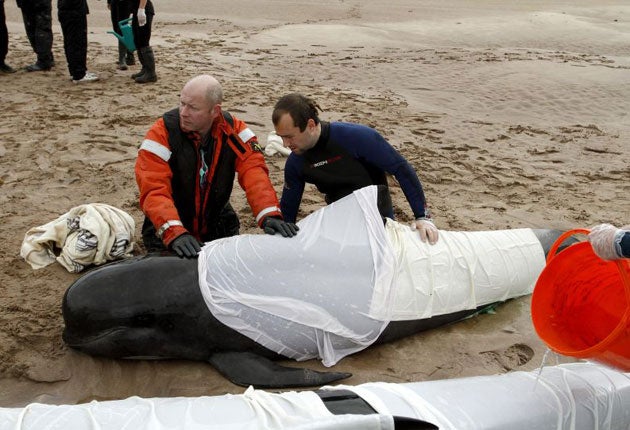Whales returned to open seas after 25 die

Your support helps us to tell the story
From reproductive rights to climate change to Big Tech, The Independent is on the ground when the story is developing. Whether it's investigating the financials of Elon Musk's pro-Trump PAC or producing our latest documentary, 'The A Word', which shines a light on the American women fighting for reproductive rights, we know how important it is to parse out the facts from the messaging.
At such a critical moment in US history, we need reporters on the ground. Your donation allows us to keep sending journalists to speak to both sides of the story.
The Independent is trusted by Americans across the entire political spectrum. And unlike many other quality news outlets, we choose not to lock Americans out of our reporting and analysis with paywalls. We believe quality journalism should be available to everyone, paid for by those who can afford it.
Your support makes all the difference.Rescuers have returned 44 pilot whales to open water after a mass stranding in an estuary of a sea loch in the Scottish Highlands.
Twenty five whales from the pod died at the Kyle of Durness when they stranded at low tide yesterday.
Attempts to refloat the whales began last night and continued in the early hours of this morning.
British Divers Marine Life Rescue (BDMLR) medics, the coastguard and the Navy managed to rotate whales that were upside down to prevent them from drowning when the tide came in.
The BDMLR said many of the whales had stranded on their sides, on top of each other and upside down and were breathing in sand.
Medics from as far as Newcastle responded and nine sets of pontoons were delivered to site overnight, but were not used as the estuary flooded too quickly. They remain on site in case they are needed over the weekend.
The water receded this morning, and several bodies were discovered on shore, thought to be of those that died last night.
Three whales were found still alive, however they have been euthanased by vets as their condition is not suitable for refloating.
Post-mortem examinations to try and determine both the cause of the stranding and the deaths of the whales will now be carried out by pathologists, assisted by BDMLR medics.
Teams from BDMLR continued to search the coast, lochs and headlands today for evidence of the other whales who, it is hoped, have returned to open water.
Join our commenting forum
Join thought-provoking conversations, follow other Independent readers and see their replies
Comments